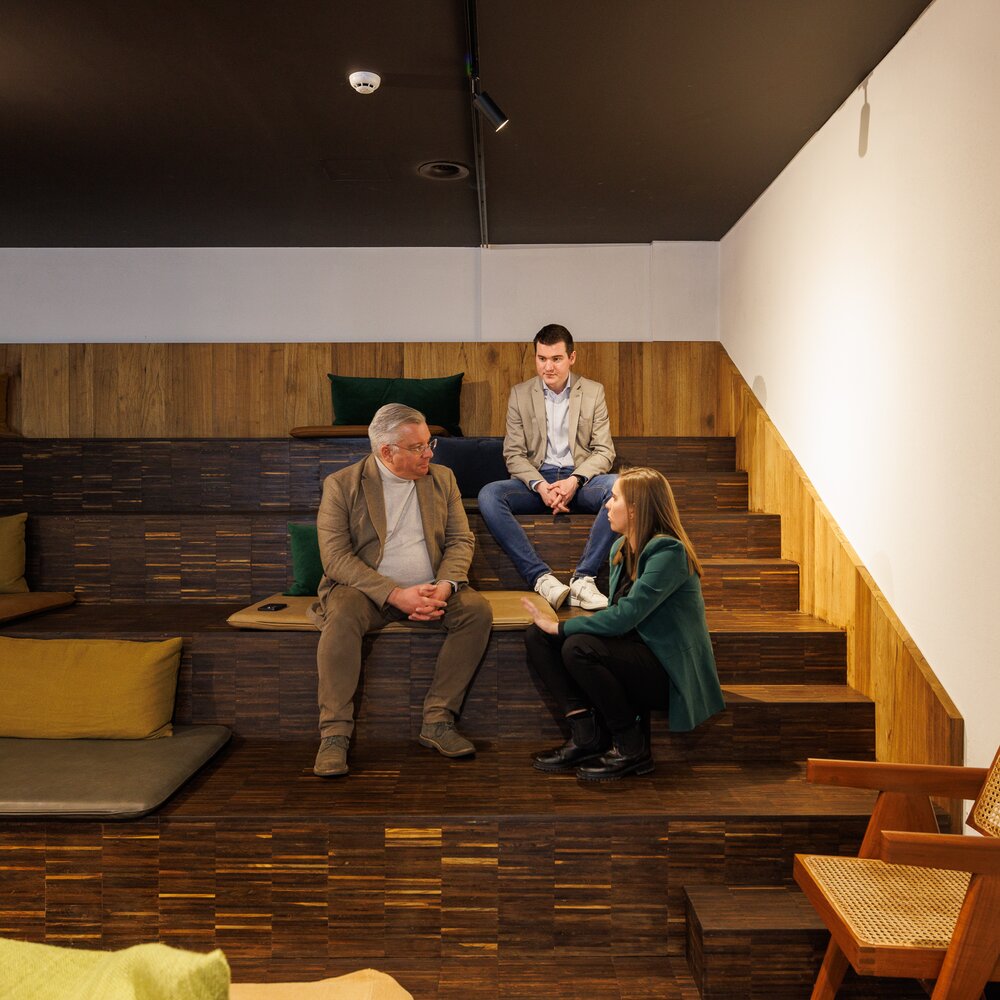Assessment & Development Centers.
An assessment centre helps organisations make informed decisions when hiring a candidate for an open vacancy or for internal promotion. The development centre provides insight into the development potential of a candidate or employee and the best way to realise this potential.

How exactly does an assessment centre & development centre work?
An assessment centre examines whether an external candidate is suitable for recruitment as a potential new employee. The added value of an assessment centre is an extra objective and scientifically based assessment of whether the candidate is suitable for the proposed position with a well-founded argumentation as to why.
A development centre, on the other hand, focuses on an internal promotion or re-orientation, or on the growth of current employees and their development opportunities. It evaluates the employee's growth potential within their current or future role, mapping out the ideal development path.
What can you expect from an assessment or development centre at CrossInt?
Our assessment centres are carried out by our own experts at Cross International or, if necessary for the necessary independence, by one of our selected partners with whom we have worked for many years.
Despite the difference in purpose of an assessment centre or a development cen-ter, the implementation is largely the same. The programme can be customised and consist of various exercises and tests:
1. Management exercise: The candidate is presented with a complex business situation in which he/she has to tackle a specific problem or challenge. This could be about developing a new business strategy, dealing with a crisis, or implementing a major change within the organisation. The candidate presents a solution and action plan to a panel of assessors.
2. Leadership role-play: In this role-play, the candidate simulates a leadership situation involving interaction with one or more fictitious employees. This could be a situation such as conducting a difficult interview, resolving team conflicts, or motivating a team. Performance is assessed based on effectiveness, empathy, and com-munication style.
3. Strength-weakness analysis: The candidate performs a self-analysis in which per-personal strengths and weaknesses are identified with regard to the predefined competences. This analysis is then discussed in more detail during an extended interview. The aim is to understand how the candidate sees his/her own competences and how he/she deals with personal development points.
4. Personality and values questionnaire: The candidate completes a questionnaire aimed at identifying personal preferences in professional situations and values that influence professional decisions. For this, we often use SHL's OPQ (Occupational Perso-nality Questionnaire). This is the most widely used personality questionnaire worldwide for assessing work-related personality traits. The questionnaire allows evaluating whether a person will enjoy performing a job (motivation analysis) and provides a scoring of the most important competences that are addressed in most jobs. The OPQ also reveals possible risks associated with personality, such as chances of manipulative behaviour, way of dealing with rules and values, respect for other people's opinions.
If the client has a preference for a different questionnaire, we will of course take this into account
5. Problem-solving ability: Not standard, but if relevant, an employee can be tested for inductive, verbal and numerical problem-solving ability. Sometimes this is also called a potential assessment, because the result is significantly related to this. This is certainly useful in complex or intellectually demanding jobs.
6. Comprehensive Interview: This interview discusses the findings from the preceding sections. Questions can relate to the ma-nagement case, the role-play, and the strength-weakness analysis. The interview also provides space for the candidate to share their own vision, values, and motivation for the role.
Each of these components provides a unique angle to assess the candidate's suitability for the role or advancement opportunities, and together they form a comprehensive and versatile assessment programme.
This is followed by a written report
Each assessment and development centre results in a report on the participant(s) based on the observations and findings of the various components. The report is sent to the client within a maximum of 5 working days after the assessment centre.
The reports are easy to understand and provide a clear summary of the results. This makes it easy for both the test subject and the assessor to interpret the results. We also avoid using expert language, so no prior knowledge is certainly required to understand the reports.
This report includes the following standard components:
- Synthesis: here we provide a general overview of the findings from the assessment centre, integrating the results of the various measurement moments (simulation exercises, personality and values questionnaires and/or cognitive profile).
- A clear recommendation regarding the participant's suitability for the job.
- Overview: a visual overview of the scores obtained and a description of the current competence level
- Summary of strengths and development points
- Development and growth adviceReview and feedback to the organisation
Review and feedback to the organization
After the assessment or development centre, the assessment or development reports are explained to the client (usually the hiring manager and/or HR).
The partner and assessor will also attend the final interviews with the participants afterwards, if required. In this interview, a number of elements from the assessment that require further discussion can be discussed.
Debriefing and feedback to participants
Each participant receives feedback and a clear explanation of the results. In this conversation, we make the participant more aware of his/her own strengths and limits, and help him/her determine how to work further on development.
During a follow-up discussion, we also assess his or her critical self-reflection. We report on the candidate or employee and advise on the next steps. In the development centre process, we also take a close look at learning opportunities
*For our assessment & development centres, we are also happy to provide specific references on request.
For more information about our assessment & development centres:
Contact Luc Van Dessel, Principal Consultant - Cross International
via luc.vandessel@crossint.eu or on +32 (0)477 77 11 73
